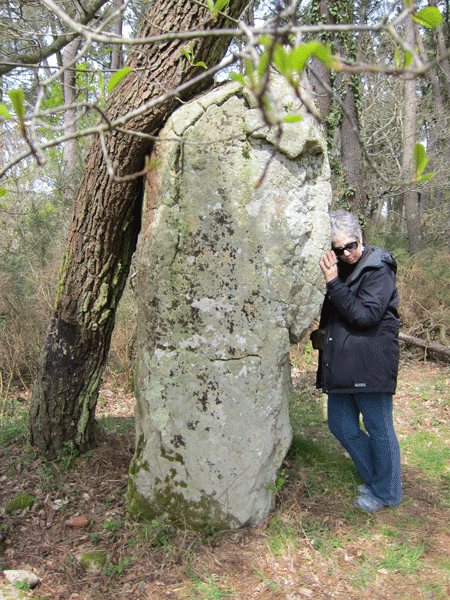In addition to nearsightedness and a deep sense of curiosity, my Dad and I shared a love of good stories. After his death two years ago, I had the opportunity to travel in his tire tracks. My road trip became a lesson in discovery, geographically and emotionally, showing me aspects of my father I had never seen and beautiful places I’d never visited. Ghosts have a creepy reputation, but my father’s made the perfect traveling companion.
Let’s start at the beginning. My Dad was Tony Hillerman. During his 35 years of writing best-selling mysteries, millions of fans treasured his stories of Navajo detectives solving crimes on the panoramic Navajo Nation. He also inspired me to start The Tony Hillerman Writers’ Conference, where he served as our most popular faculty member for several years.
Before Dad died in late October of 2008, my photographer husband Don Strel and I had launched our own book project, “Tony Hillerman’s Landscape: On the Road with Chee and Leaphorn” to show readers who had never been to Indian Country the settings in which the fictional Tribal Officers solved crimes. I gathered quotes from Dad’s books that described places where his detectives pause to comment on the scenery in Arizona, New Mexico, Utah and Colorado. Then we hit the road for Baby Rocks, Teec Nos Pos, Toadlena, Church Rock, Kayenta, Tsaile, Tuba City and other breathtaking places Dad loved.
Don and I finished the book with both relief and regret a few months after Dad died. We decided to promote it and honor my father’s memory with talks and slideshows to support public libraries. Little did I know that I would be getting most of the benefit, priceless stories from people in the audience whom my Dad had touched: loyal readers, distant relatives, Indian consultants, long-lost friends, and former co-workers and students from his days at the University of New Mexico.
At the small Placitas, N.M. library, a woman came up to me after my talk. “I have to tell you how I stalked your father,” she said. I was all ears.
“I was at the Crownpoint rug auction and I didn’t know anything about Navajo weaving. I noticed this man, a rather portly gentleman, going from table to table, picking up the rugs, chatting with the weavers. So I just followed along behind him hoping to learn something.”
The tiny western New Mexico town of Crownpoint hosts the largest auction of contemporary Navajo weaving in the world, drawing weavers from throughout the reservation and buyers from around the world. Dad used it as a setting in several of his books.
“The auctioneer took the stage and said he had a special guest to introduce, a friend of the Navajo people, Tony Hillerman. I’d read all his books, and here I was stalking him. I don’t know when I’ve been so embarrassed.”
I asked if he bought any thing after all that inspection.
“He bought every small rug from every weaver that came up for sale,” she said. “I wonder what he did with them?”
Dad had never told me this story, but I knew. He and my mother had purchased them to help the weavers, and given them as gifts to friends. I heard of this quiet generosity often on my travels, from donations of buses for the reservation’s St. Bonaventure school in Thoreau, N.M. to lights for the high school football stadium at Monument Valley, Utah and tuition paid for Indian students here and there.
After another talk in another town, a woman raised her hand. “I have to tell you how your Dad paid my mortgage,” she said. She had been out of work for several months. Feeling desperate as her next house payment came due, she glanced up, praying for inspiration, and noticed a hardback copy of Fly on the Wall, Dad’s second novel, at the top of her bookshelf.
“I loved that book, and I was so happy when he signed it for me,” she said. “It was a first edition. I made enough when I sold it to pay the back mortgage…and buy a little paperback version to replace it.”

In Winslow, Arizona, a dusty Route 66 town near both the Navajo and Hopi reservations, I spoke in a museum that had once been a trading post and now housed the Chamber of Commerce. The audience, a mixed lot of former hippies, retirees, Indian Health Service workers and desert rats, included a middle-aged Navajo man who arrived early and sat near the front.
“You did alright,” he said to me afterwards. “I met your Dad once. He did alright, too.”
In California, a woman at another library event told me she met my Dad through her work with a writers ’conference that invited him to speak. She was assigned to drive Dad from the airport to the conference hotel. They passed a homeless man with a sign.
“Your Dad asked me to pull over. He got out of the car and walked over to the guy and gave him $20. I said, ‘Do you know that you just got some help from the author Tony Hillerman?’
“Tony?” the homeless man said with a grin. “Mr. Hillerman, I’ve read all your books!”
I can see my Dad grinning. He loved nothing more than encounters with his fans.
I guess I share that with him too.
![]() View More Photos *photography courtesy Don Strel Photos
View More Photos *photography courtesy Don Strel Photos
Anne Hillerman shares stories of her Dad in Tony Hillerman’s Landscape: On the Road with Chee and Leaphorn (HarperCollins). She is a founder of the Tony Hillerman Writers Conference, Nov. 11-13, 2010 in Santa Fe, N.M. www.annehillerman.com and www.wordharvest.com



